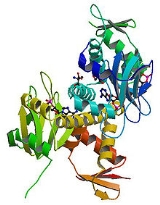
CAMP receptor protein
Encyclopedia
cAMP receptor protein is a regulatory protein in bacteria
. This protein
binds cAMP
, which causes a conformational change that allows the protein to bind tightly to a specific DNA sequence in the promoters of the genes it controls. The genes regulated by this protein are mostly involved in energy metabolism, such as galactose
, citrate
, or the PEP group translocation
system.
Bacteria
Bacteria are a large domain of prokaryotic microorganisms. Typically a few micrometres in length, bacteria have a wide range of shapes, ranging from spheres to rods and spirals...
. This protein
Protein
Proteins are biochemical compounds consisting of one or more polypeptides typically folded into a globular or fibrous form, facilitating a biological function. A polypeptide is a single linear polymer chain of amino acids bonded together by peptide bonds between the carboxyl and amino groups of...
binds cAMP
Cyclic adenosine monophosphate
Cyclic adenosine monophosphate is a second messenger important in many biological processes...
, which causes a conformational change that allows the protein to bind tightly to a specific DNA sequence in the promoters of the genes it controls. The genes regulated by this protein are mostly involved in energy metabolism, such as galactose
Galactose
Galactose , sometimes abbreviated Gal, is a type of sugar that is less sweet than glucose. It is a C-4 epimer of glucose....
, citrate
Citrate
A citrate can refer either to the conjugate base of citric acid, , or to the esters of citric acid. An example of the former, a salt is trisodium citrate; an ester is triethyl citrate.-Other citric acid ions:...
, or the PEP group translocation
PEP group translocation
PEP group translocation, also known as the phosphotransferase system or PTS, is a distinct method used by bacteria for sugar uptake where the source of energy is from phosphoenolpyruvate . It is known as multicomponent system that always involves enzymes of the plasma membrane and those in the...
system.

